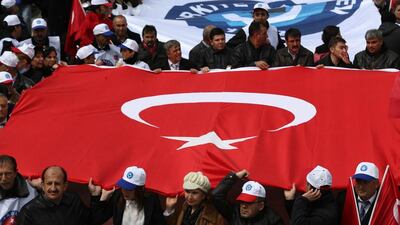When president Recep Tayyip Erdogan’s AKP took office more than a decade ago, Turkey was facing dire economic prospects and a rather small role in the region. In a remarkably short time, however, Mr Erdogan transformed his country into a regional power using a blend of neo-Ottoman foreign policy, liberal economics and social conservatism. Istanbul emerged as an international aviation hub that conjures up the city’s former glory as the seat of Ottoman strength. The country also looked set to become an energy hub connecting the Middle East and Asia with Europe. Turkey’s “no problem with neighbours” approach to regional challenges allowed Ankara to expand its diplomatic reach in the Middle East and beyond. Then the Arab Spring erupted and Turkey made a series of very bad decisions.
Throwing its weight squarely behind the Muslim Brotherhood in Egypt while developing a staunchly anti-Assad policy in Syria, Mr Erdogan destroyed much of the foreign policy capital he had built up early in his rule. What was once a dynamic and open approach became narrow and led to an isolated position in the region.
As the consequences of these decisions began to take effect in 2013, Mr Erdogan’s rule came under attack at home. Far from benevolent conservatism, Mr Erdogan reacted to the criticism with an iron fist by violently suppressing non-violent protests in Istanbul. While these developments are significant for the future of democracy in Turkey, the truth is that the country’s foreign policy is in a shambles.
Having just returned from state visits to Tehran and Riyadh, it is clear that Mr Erdogan is seeking a place for himself in the region’s political landscape. The ease with which Turkey is welcomed in both capitals illustrates the important role that Mr Erdogan can play in facilitating peaceful solutions to the myriad conflicts facing the Middle East. Responding to the challenges facing the region, he has said that he doesn’t care about Shia or Sunni, but that he cares “about the Muslim”, yet it is clear that he is unsure of where Turkey fits in after its aggressive support of the Brotherhood.
Now more than ever, we need Turkey to transform its geographical advantage into a diplomatic reality. If he can keep his grand ambitions at bay, Mr Erdogan can improve his country’s standing in the Middle East and on the world stage.

